- Home
- Karen Hawkins
Her Master and Commander Page 2
Her Master and Commander Read online
Page 2
Brooks’s gaze moved back to Tristan, something dismally sad in their depths. For a second, Tristan thought the tutor might save him after all. But instead, the man’s shoulders slumped and he turned and went silently out the door.
Anger exploded behind Tristan’s eyes. He sucked in a deep breath and lurched free from Danter’s grasp. “Christian! RUN!”
Danter grabbed Tristan by the throat, his fist drawn back, his face twisted in anger.
As if in a dream, Tristan saw the fist coming toward him. There was nothing to be done. He was lost. All he could do was hope that Christian had made it, that Tristan hadn’t killed his only brother by shoving him out the window.
It was the last thought he had before the fist met his temple and, with an explosion of white pain, blacked his mind to everything else.
Chapter 1
A butler’s primary purpose is to serve his employer thoroughly and discreetly. Valor is the first part of discretion. It also helps to possess a large dose of tolerance and a very, very short memory.
A Compleat Guide for
Being a Most Proper Butler
by Richard Robert Reeves
Rochester House
Somerset, England
1806
Pristine and perfect, the river wound through carefully tended forests, flirting here and there with the stone-paved path before gently toppling into a wide, crystal clear pond. The deep blue waters reflected the flawless outline of a meticulously planned rotunda decorated with several columns and a pink marble fountain. Over the years, the rotunda had served as a trysting spot for lord, lady, prince, and pauper.
Over this astonishingly well orchestrated bit of idyllic beauty rose a nearby hillock. On it, set like a crown on a velvet pillow, sat a massive and stately manor house of lush gold brick, the mullioned windows sparkling enticingly in the late afternoon sun.
Rochester House was widely agreed to be the epitome of culture. The king himself had lauded the house and its furnishings as “the most exquisite in all of England.”
The comment had been made almost two score years ago, and at the time, the sixth earl had merely bowed his head ever so slightly to acknowledge it. Privately, of course, he’d been quite pleased, but it would have been ill-bred to have appeared so. And a Rochester was never, ever ill-bred.
Still, the earl allowed himself a generous amount of time in private to savor the king’s admiration. Each night, before closing his eyes, he remembered the words and the exact expression on the king’s face as he uttered them. It helped Rochester fall asleep and often gave him the most delightful dreams.
Except now, of course. Now, he was far too busy with the irritating duty of dying with dignity.
The dying part was, he thought, rather simple. It was the “with dignity” portion that was a struggle. But then, anything worth doing was worth a good fight. The earl had learned that caveat long, long ago.
To be honest, Rochester should not have been surprised that he was dying. After all, he was well past his seventieth year of age, a fact he attempted to hide from his peers by keeping to powdered wigs for as long as fashion allowed, the liberal use of rouge, and a superb wardrobe that dazzled the eye and removed notice from his sagging skin and wrinkled brow.
To further add to the illusion of youth, he’d married a woman who was, by any count, more than half a century younger than he. Ostensibly, he’d married the lovely, vapid Miss Leticia Crowell for the express purpose of adding a beautiful woman to his household, much like purchasing a certain type of orchid to decorate one’s dinner table.
The truth was, Rochester was desperate for a child. He’d thought to marry, produce a son, and thus secure his lands, fortune, and title. He winced even now at the crassness of it all. It was so tawdry, this breeding aspect. Sex for the purpose of pleasure was an art. Sex in an effort to bring forth a mewling child—Rochester curled his lip.
He’d never thought he’d have trouble fathering a child. After all, he’d managed to father brats before he was married, why would he have any difficulties after? Which was why he’d waited so long before tying himself to the demands of some silly chit who had to be told twice that one did not wear diamonds to a morning visit. Yet as much as he’d disliked the notion, he knew his duty and so, with the greatest reluctance, he’d married.
Unfortunately, fate had a cruel sense of humor. Now, here he was, gasping his last breath, married to a chit with more hair than wit, and not a single legitimate son to inherit either his wealth or the Rochester name. The name he’d worked so hard to build into something unique, something memorable, much like this house, was destined to die with him.
His fingers curled over the single sheet of paper resting in his hand, the noise drawing his gaze. Ah, yes, the list. He smiled a little, relieved. There was hope, after all.
He would make right all the things he’d done wrong. Even from the grave, he would maintain the quality of the Rochester name and keep the house in the family. It was a bold plan. But then…he was a bold man.
He smiled, wincing when a sharp pain rattled through his shoulder, the pressure on his chest increasing. Damn it, he had so little time left. Why had he waited so long?
The huge mahogany door that led into the earl’s chamber opened and a tall, perfectly groomed individual entered. The man was dressed in the deep black of a butler, his air stately and calm. He carried a silver tray covered with a linen cloth.
Rochester never allowed any but the most elegant of servants in his employ. Yet even he had to admit that his butler, the indispensable Reeves, was a gem among gems. There was something startlingly commanding about Reeves. Dark and slender, his hair traced over each ear with a distinguished stroke of gray. And his wicked way of putting a shine on boots had caught even Beau Brummel’s attention.
Rochester had the world’s best butler and the entire ton was aware of it. Four times in the last two months alone, other members of the nobility had attempted to hire Reeves away, but Rochester knew the man’s worth and he paid the butler a fortune.
Reeves set the tray on the table beside the bed. He removed a silver cover to reveal an amber-filled glass.
Rochester’s hopes rose even more. “Bourbon?”
“Indeed, my lord.”
“But Letty said she’d poured my bourbon out the window!”
“Had I realized what my lady was about, I might have been able to talk her into a more rational act, such as sending the bourbon to your summer estate. Alas, I was too late.”
“Blasted interfering chit!”
“Lady Rochester was distressed you refused to listen to the doctor’s good advice and continued to imbibe.”
“I may be ill, but I am not yet dead!”
“No, indeed, my lord. Fortunately for all concerned, I just this moment recalled I had hidden a stray bottle of bourbon in the cellar in case the troubles with France worsened and our supply dwindled.”
“Reeves, you are a godsend,” Rochester said fervently, wetting his dry lips and struggling to sit upright.
Reeves assisted him, plumping the earl’s pillow and smoothing the sheets, all the little touches that made Reeves so indispensable.
It took Rochester a few moments to catch his breath after such an effort, during which time Reeves discreetly pulled a small vial from his pocket and held it over the coveted bourbon. A few drops plopped into the glass.
“Hold!” gasped Rochester, appalled. “What are you doing?”
“Putting your tonic in your bourbon, my lord.”
“I don’t want that damn stuff!”
Reeves calmly picked up a waiting spoon and gently stirred, the silver clinking against the fine glass. “No bourbon, my lord? None at all?”
“I want the bourbon, damn you! But not that vile tonic.”
“I realize that, my lord. So did the doctor when you had him ejected from the house by the footman.”
That had been a bit rude of him, Rochester realized, though the charlatan had deserved it. “I don�
�t need tonic.”
Reeves looked at the earl’s hand.
Rochester became aware that he was rubbing his chest with his palm, trying to erase the constant pressure. He dropped his hand. “Take that poison away! I won’t have it now.”
Reeves put the spoon back on the tray and replaced the silver cover over the glass. “Very well, my lord.” He picked up the tray. “Will there be anything more? Some sherry, perhaps?”
Rochester sent his butler a sour glare. “Sherry is horse piss and water! Just leave. My valet, Miller, will fetch me a fresh glass of bourbon.”
“Your valet would indeed fetch you a glass of bourbon…if he knew where to find it.” Reeves walked sedately to the door. “Which, of course, he does not.”
“You said you found the bottle in the wine cellar, so I shall have him look for it there,” the earl said testily.
Reeves paused at the door. “Was, my lord. The bottle was in the wine cellar. Now however, it is not.”
Rochester cursed, loud and long.
The butler’s bland expression never changed. But as soon as the earl’s outburst subsided, Reeves said, “I shall tell Miller to bring some tepid milk, to help with your bilious stomach.”
“I don’t have a bilious stomach and you know it! Oh blast you to hell, bring me that damn bourbon. I only hope you have not completely ruined it with your poison.”
The glass of bourbon was in Rochester’s hand in a remarkably quick space of time. He sniffed it suspiciously, then took a sip. A warm tingle settled in his chest as the flavor flooded across his tongue. “Ah!”
Reeves smiled. “The tonic did not alter the taste too much?”
There was hardly any trace of the bitter tonic in the bourbon at all. Still, it would not do to let Reeves become too self-important. Rochester needed the butler’s services too badly for that. Now more than ever. So instead of agreeing, the earl said testily, “It will do.”
Rochester took another sip, then lowered the glass and looked at his butler. “I’m glad you’re here, Reeves, for I’ve something to ask.”
Reeves picked up his lordship’s robe and placed it neatly in a large, gold leaf wardrobe. “Yes, my lord?”
“You are paid better than any butler in England.”
“Yes, my lord. And I am worth every pence.”
He had a point, Rochester thought grumpily. “I am not suggesting that you are not valuable. I only stated that you were paid well.”
“How good of you to differentiate those two items, my lord,” Reeves intoned.
Rochester eyed him narrowly. “That sounded like sarcasm.”
Reeves gave a faint smile. “Sarcasm has a certain value, does it not? Perhaps I should ask for more wages for possessing such a sense of humor.”
Rochester stared. “I should pay you for sarcasm?”
“I would rather think of it as compensation for putting up with yours, my lord.”
Despite the ache that set on Rochester’s chest, a laugh burst from him. “Damn you, Reeves! I should horsewhip you for being so cheeky.”
“Ah, but I know where the last and only bottle of bourbon is hidden.”
The medicine and bourbon was beginning to have an effect; the pressure in the earl’s chest lessened a little and a gentle glow enveloped him as he set the empty glass on the table beside the bed. “Reeves, I must speak to you. It’s about all of this—” He waved a hand to the room, indicating the entire property. “—when I die.”
“Shall I fetch her ladyship—”
“Good God, no! Why would I want to do that? All that caterwauling—Reeves, I wish I hadn’t married. Not that I’ve anything against Letty, mind you. It’s just that, without an heir, there’s really no reason for me to have been married at all.” The earl attempted to smile. “But that is neither here nor there. Reeves, you have gone above and beyond your duty since the day you arrived.”
“Thank you, my lord. It has been a privilege.”
“That is why I want you to find my successor.”
Reeves paused in folding the sheet to a more comfortable length beneath his lordship’s pale hands. “My lord?”
“I am dying, damn it! I don’t have time for quibbling.”
Reeves’s lips twitched. “My lord, whether you have time to quibble or not, I do believe I shall need more information than what you’ve offered thus far.”
For some reason, the gentle tone made Rochester’s throat tighten. “It’s quite simple. I want you to find my heir and see to it that he does not embarrass the Rochester name.”
“Your heir, my lord?”
The earl reached for the folded sheet of paper he’d set aside. He opened it now and consulted the scrawled list. “While I was unable to have a child in wedlock, I have been more than blessed without.”
Reeves’s brows rose. “My lord?”
“The eldest of my bastards—though he won’t be one forever—will be the next earl.”
“But…Pardon me, my lord. I am somewhat confused.”
The earl took a deep breath. “Reeves, I just remembered I was once wed.”
Rochester watched the butler closely, looking for some expression of surprise, but all Reeves said was, “Ah!”
The earl waved a hand rather lamely. “It was a…a rather secret marriage, but my man of business has the details well in hand. The priest who performed the marriage has been found and has been made to recollect the event. We’ve even found the register it was recorded in—but you don’t need the details. Just know that it has all been taken care of.”
“I see. How, er, fortuitous for your son. Do you think society will accept this story?”
“They have to. The priest is now the archbishop of Canterbury.” Rochester chuckled. “He’s a hot-tempered man, too. If one of my distant relatives comes crawling out of the woodwork and attempts to nay-say him, he’ll toss them right out of the church and onto their arse.”
The earl grinned. “Damn! I’d like to see that! I almost wish I wasn’t dying so I could watch!”
“Perhaps your son will enjoy the sight for you, my lord.”
“Not ‘son.’ Sons. They were twins. The oldest has been going by the name of Tristan Paul Llevanth.”
“Llevanth.” Reeves said the name quietly, thoughtfully. “That name is familiar.”
The earl grimaced. “I know, damn it. The blasted fool had to go out and make a name for himself, which was extremely ill-bred. But I cannot do anything about it now.”
“No, my lord,” Reeves said, his brow drawn as he tried to remember where he’d heard the name before.
Rochester frowned peevishly. “I did love Pauline and if I could have saved her—she was unjustly charged with treason. That is what comes of such an unconventional upbringing. Her father had untenable political beliefs and encouraged her to read all sorts of rubbish.”
“Rubbish, my lord?”
“All sorts of political foolery. He died well before I was around, which was a damned good thing. She had very strong opinions that did not always do her beauty justice.”
“Yes,” Reeves said. “Strong opinions are so unbecoming.”
Rochester shot a hard look at the butler. “What does that mean?”
“Nothing, my lord. Nothing at all.”
“Humph. Pauline and I eventually parted, though I sent her funds for the boys.” The earl frowned. “Damn it, why couldn’t Letty—but no. That does not matter now.” He sent a faintly regretful glance at Reeves. “I perhaps did not visit my by-blows quite as I should have.” The earl fretted over this a moment, then sighed. “I cannot fix that now. Anyway, as I was saying, all was well until Pauline was accused of treason. It was a very nasty business.”
Reeves adjusted his lordship’s pillow. “I am certain you did all you should have, my lord.”
“I wasn’t here to assist her. If I hadn’t been out of the country—” Rochester didn’t speak, emotion tight in his chest.
“My lord?” Concern etched Reeves’s voice.
“I was in Italy. It took me weeks to get back. As soon as I landed, I went to see the king, but…I was too late. She had died in prison the previous week and the boys were gone. Vanished! I tried to find them, but there was no trace to be had. Until—” Rochester pressed his lips together.
“Until?” Reeves prompted gently.
“I read Tristan’s name in the blasted paper. I cannot tell you how horrified I was, to see someone of my own blood, his name bantered about as if he were a commoner!”
“Yes, my lord.”
The earl tried to remember his sons, but could only dredge up the faintest picture. “I seem to remember that they were handsome youths, though quite different in coloring.”
“If they had the Rochester looks, I am certain they were very handsome indeed.”
“All of my children are extraordinarily well-looking,” Rochester said sternly, hoping it was so.
“All of them, my lord?”
Rochester looked at the list in his hands, a faint flush coloring his pale cheeks. “Dying is so damned unfair! Here I am, a leader of society, known to all, an intimate of the prince’s, and what happens but—” He gestured angrily at his thin and wasted frame. “—this! I never thought things would come to such a pass.”
“Yes, my lord. Dying is wasted upon the well dressed.”
Rochester’s eyes narrowed. “Are you mocking me?”
“Never, my lord. It’s just that I find it somewhat disturbing that you thought you’d never die. We all die, my lord. It would be unnatural, otherwise.”
The earl’s shoulders slumped. “I know, I know. I just—Damn it, I’m not finished yet! I was also going to hold a ball for Letty’s birthday, and the prince had promised to attend, which would make it quite the event of the season—But it is too late for all of that, damn it.” The earl handed the list to Reeves. “Here. These are my children. I was going to find them myself, but—Well, it is not to be.”
“One of the ironies of this business of living is that we never really finish. Whatever time we have, we fill it, and when it empties, we fill it yet again.” Reeves unfolded the paper. “I do not believe there is such a thing as enough time, my lord. For anyone.”

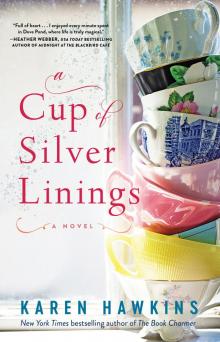 A Cup of Silver Linings
A Cup of Silver Linings The Book Charmer
The Book Charmer The Prince and I
The Prince and I![Duchess Diaries [2] How to Pursue a Princess Read online](http://i1.bookreadfree.com/i/03/12/duchess_diaries_[2]_how_to_pursue_a_princess_preview.jpg) Duchess Diaries [2] How to Pursue a Princess
Duchess Diaries [2] How to Pursue a Princess To Scotland, With Love
To Scotland, With Love Her Master and Commander
Her Master and Commander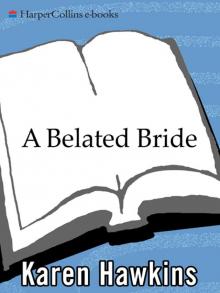 A Belated Bride
A Belated Bride 1794_Charlotte
1794_Charlotte The Abduction of Julia
The Abduction of Julia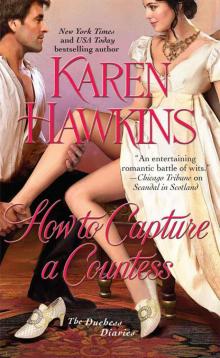 How to Capture a Countess (Duchess Diaries 1)
How to Capture a Countess (Duchess Diaries 1)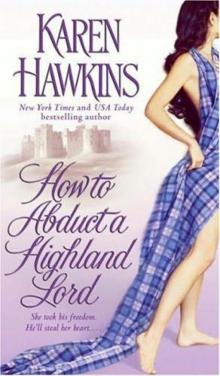 Karen Hawkins - MacLean 1 How to Abduct a Highland Lord
Karen Hawkins - MacLean 1 How to Abduct a Highland Lord The Princess Wore Plaid
The Princess Wore Plaid How to Abduct a Highland Lord
How to Abduct a Highland Lord THE LEGEND OF NIMWAY HALL: 1794 - CHARLOTTE
THE LEGEND OF NIMWAY HALL: 1794 - CHARLOTTE Caught by the Scot
Caught by the Scot The Lady in the Tower
The Lady in the Tower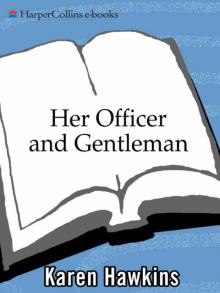 Her Officer and Gentleman
Her Officer and Gentleman Hurst 02 - Scandal in Scotland
Hurst 02 - Scandal in Scotland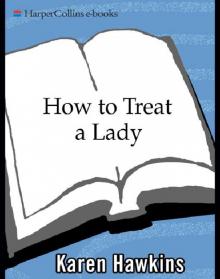 How to Treat a Lady
How to Treat a Lady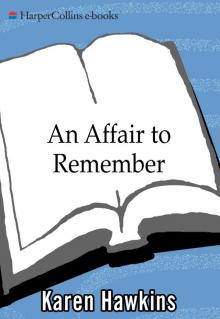 An Affair to Remember
An Affair to Remember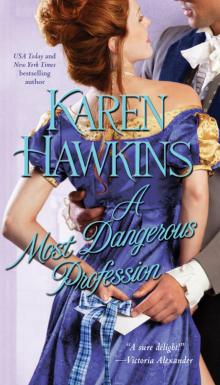 A Most Dangerous Profession
A Most Dangerous Profession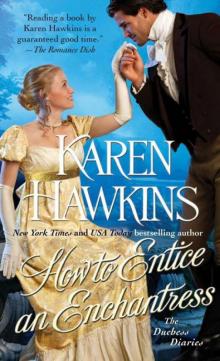 How to Entice an Enchantress
How to Entice an Enchantress The MacLeans: Sleepless in Scotland
The MacLeans: Sleepless in Scotland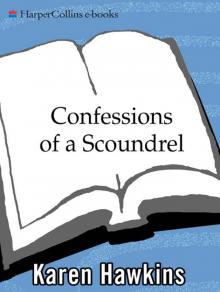 Confessions of a Scoundrel
Confessions of a Scoundrel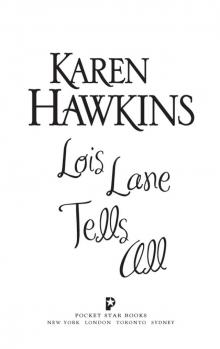 Lois Lane Tells All
Lois Lane Tells All The Prince Who Loved Me (The Oxenburg Princes)
The Prince Who Loved Me (The Oxenburg Princes) The Seduction of Sara
The Seduction of Sara The Laird Who Loved Me
The Laird Who Loved Me The MacLeans - Sleepless in Scotla
The MacLeans - Sleepless in Scotla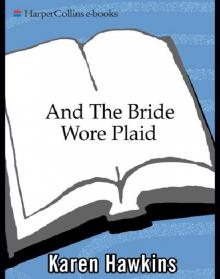 And the Bride Wore Plaid
And the Bride Wore Plaid THE LEGEND OF NIMWAY HALL_1794_CHARLOTTE
THE LEGEND OF NIMWAY HALL_1794_CHARLOTTE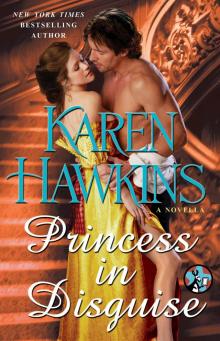 Princess in Disguise
Princess in Disguise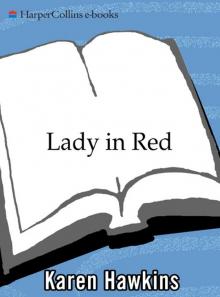 Lady in Red
Lady in Red Much Ado About Marriage
Much Ado About Marriage Twelve Kisses to Midnight: A Novella (The Oxenburg Princes)
Twelve Kisses to Midnight: A Novella (The Oxenburg Princes) Mad for the Plaid
Mad for the Plaid An Encounter at Hyde Park
An Encounter at Hyde Park